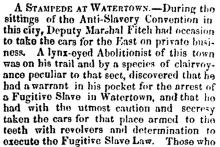A STAMPEDE AT WATERTOWN.––During the sittings of the Anti-Slavery Convention in this city, Deputy Marshal Fitch had occasion to take the cars on the East for private business. A lynx-eyed Abolitionist of this town was on his trail and by a species of clairvoyance peculiar to that sect discovered that he had a warrant in his pocket for the arrest of a Fugitive Slave in Watertown, and that he had with the utmost caution and secrecy taken the cars for that place armed to the teeth with revolves and determination to execute the Fugitive Slave Law. Those who were present in Corinthian Hall that morning will long remember the appearance of a little band of "earnest men" at the eastern door whose every look, and word, and action, betrayed the depth of their purpose and the sublimity of their mission. Brief and significant inquires were made in regard to the whereabouts of Abolitionists in Jefferson County, and then they vanished as hurridly as they came. A telegraphic thunderbolt was forged and despatched to some Brother in Watertown, directing the fugitive John Douglass, formerly of Rochester, to do his "speedy utmost" until the St. Lawrence should roll between him and the blood-thirsty Marshal. Great was the consternation produced in that enterprising town when this missive was circulated through its streets.––Public meetings were called, public indignation boiled over, and the fugitive was hurried across into her Majesty's dominions as fast as Steam could carry him. Next morning Marshal Fitch was quietly as home having had no warrant for Douglass, no evil designs upon anybody, and no intention of going to Watertown at all––though having lived twenty or thirty years in that place it would naturally given him pleasure to revisit it, but when he does go he hopes to create less disturbance than his Abolition friend's telegraph despatch occasioned.
All this may be true enough, as to the case of JOHN DOUGLAS; but, that a slave-hunter was in this city, and did call upon the U.S. Commissioner, for papers to arrest three young men, supposed to reside in this vicinity; and that such papers were procured; and that GEORGE R. AMOS, (slave-hunter) of Maryland did go to the house of Marshal Fitch, during the recent anti-slavery meeting, with the said papers, with a view, to having the arrests made, is positively known to the "lynx-eyed abolitionist" of this town.
The American does not tell us that the Marshal would not go on such a blood-thirsty mission, as that of hunting down a fellow-man guilty of no crime, but that he did not go in this particular instance. Why don't he come out at once, in obedience to the feelings of his better nature, and tell his community that he has performed his last slave hunt. He will then cease to be dogged by the troublesome, lynx-eyed abolitionists.––ED.
"A Stampede at Watertown," Rochester (NY) Frederick Douglass' Paper, June 3, 1852, p. 2.

